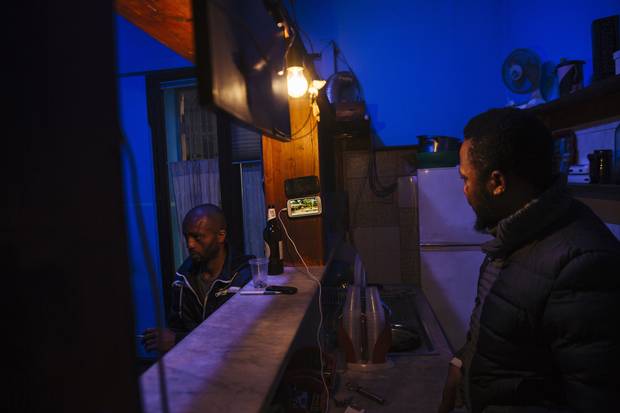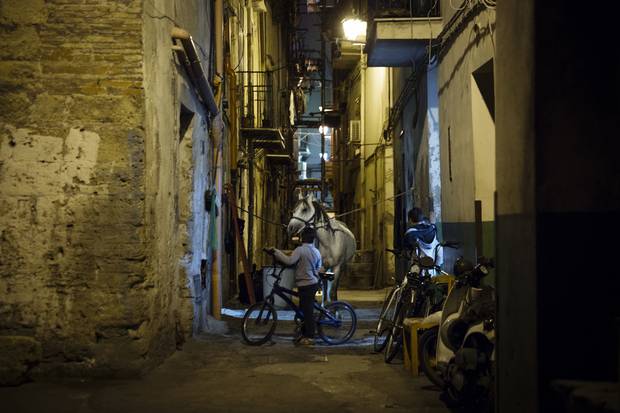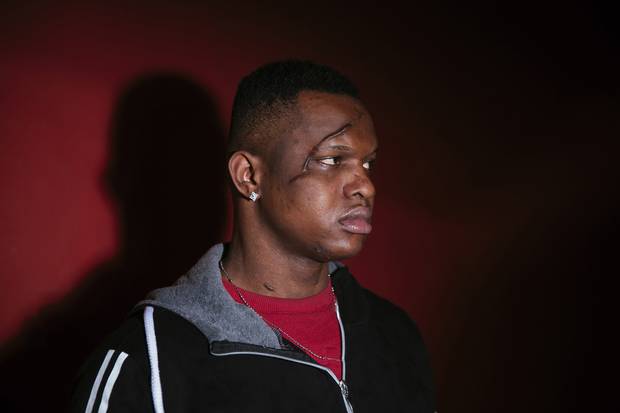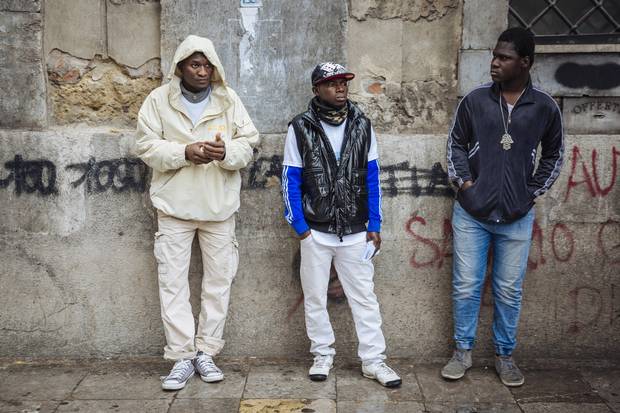
A mobile phone is used as a television in a nightclub in Palermo’s old town centre.
Photography by Francesco Bellina for The Globe and Mail
By day, the Ballaro market in the ancient heart of Palermo is a riot of colour and noise, a delightful assault on the senses. The Italian merchants lure their customers by singing ditties or simply shouting at them in Sicilian dialect: "Chi su belli stu puma!" – Come see my beautiful apples.
The seemingly endless stalls are piled deep with blood oranges, lemons, chicory and melons; the fish trays are loaded with cuttlefish, octopus, prawns and sea bass. Some of the old Sicilian merchants make chickpea fritters, a local specialty. Ballaro is listed as a must-see in the Sicilian guidebooks and the tourists are all smiles.
By night, Ballaro's mood changes. The street merchants are gone, their stalls packed up. No tourists are in sight, not one. The streets are full of African men, mostly young Algerians. They sit in bars, hang around on corners or in small shops, which seem to double up as informal living rooms after the sun sets. Absolutely everyone – the police, the state prosecutors, the Sicilians – knows that the Africans are selling illegal drugs, including marijuana, hashish, cocaine and heroin. Some are running prostitutes.
In reality, Ballaro by night is Sicily's biggest open-air drug supermarket. The refugee crisis has hit Sicily particularly hard and one of its disturbing developments is that some of the Africans who land in Sicily and don't flee north to Germany or Sweden are staying put and resorting to lives of crime. Some of them simply walk out of refugee camps before their status is determined and legally vanish.
So far, they have been successful not because they are ruthless, but because they are working with the Sicilian Mafia, known as the Cosa Nostra, which has controlled Ballaro and other Palermo areas for decades. "It is impossible to think that the Nigerians who deal drugs in Ballaro do so without the permission of the Sicilian Mafia," said Leonardo Agueci, the deputy chief prosecutor in Palermo who investigates organized crime.
The question: Will the alliance between the Nigerians and the Mafia last or will it, eventually, erupt in violence if a power struggle between the two groups emerge. "A war could happen, but if it does, we think it's a long way off," said an Italian state prosecutor who did not want his name to be used because he does not want to publicize his investigations into Nigerian crime in Sicily.
Francesco Bellina, a Palermo photographer who knows Ballaro inside out, gave me a nighttime walking tour of the area. He has worked as volunteer at a migrants centre called Porco Rosso – Red Pig – for two years, knows many of its residents, including some drug dealers, and has taken thousands of photos of neighbourhood Ballaro life, including the illegal horse races that the Mafia holds on its streets.

Children look after a horse in a Palermo street. Horses are often raised in old empty houses and used for street racing managed by the Mafia.
Mr. Bellina started by showing me a recent photo he took of a 27-year-old Nigerian, Don Emeka, whose forehead and forearms bore deep, ugly scars. The scar on his left forearm was in the shape of an "X" and was done with a machete – the traditional mark inflicted on the victims of the Nigerian Black Axe gang, which has outposts in Palermo, Turin and other cities around the world, including Toronto.

Don Emeka bears the scars the Black Axe gang traditionally leaves on its victims.
Mr. Emeka was allegedly attacked by a suspected Black Axe member in Palermo named Austin Ewosa – better known as John Bull – who is 32 and was arrested in 2014 for assault, attempted murder and criminal-network association. He is also suspected of having worked with Sicilian Mafia in the Ballaro drug trade.
The prosecutors suspect that Mr. Ewosa attacked Mr. Emeka not because the two men are mortal enemies, but because they had a spat and Mr. Ewosa allegedly delivered the sort of punishment that would make it clear that he was the new African power in Ballaro.
Mr. Ewosa has denied all the charges.
As far as prosecutors are concerned, the attack was more evidence that Nigerian criminal activity is on the rise in Italy as asylum-seekers pour into the country.
During the tour of Ballaro, Mr. Bellina and I kept our voices low and never lingered in one spot. I was obviously an outsider – a big guy who could be mistaken for a cop – and he wanted us to attract as little attention as possible. He pointed out a crack house, a boarded-up apartment building that was, until recently, a flophouse for illegal immigrants, a Nigerian apartment that had been torched by Italians when the Nigerians and the Italians got into fight over excessive noise made by the Italian children, of all things, and two young African women who were obviously prostitutes. "The little one can't be more than 16 years old," Mr. Bellina said.

African migrants are shown after a demonstration against violence in their neighbourhood.
Sicilian police and prosecutors do not know now many Nigerians have settled in Sicily, for the very good reason that many, perhaps most, are not registered. Their best guess is about 2,000. "They are illegal for the most part, which is also why they don't speak out about crimes," said the prosecutor who did not want to be named.
What they do know is that many of them, including Mr. Ewosa and other suspected Black Axe gangsters, came through the big Caltanissetta refugee camp in central Sicily. As far back as 2011, well before the height of the refugee crisis, Italian prosecutors were alerted by the Nigerian ambassador in Rome that potential Nigerian criminals were coming into Italy and elsewhere in Europe.
In a letter to prosecutors, he said: "I would like to draw your attention to the new criminal activity of a group of Nigerians belonging to secret societies, forbidden by the government because of violent acts. Unfortunately, former members of these sects were able to get into Italy, where they established criminal organizations."
The Palermo prosecutors do not think that Nigerian crime in Sicily constitutes a crisis – yet. The extent of the Black Axe gang is unknown, though is probably fairly small; the trial of Mr. Ewosa, which is due to wind up in July, should shed some light on the extent of their power.
What is known is that Nigerian drug dealers are taking over the street-level drug trade in Ballarò and that they're doing it in co-operation with, and the permission of, the Sicilian Mafia.
"Definitely, they have a relationship with the Mafia for illegal activities in Italy," Mr. Agueci said. "The Nigerians are dealing the drugs, but they always abide by the Sicilian Mafia. The Nigerians are doing the dirty work. If they get arrested, the Cosa Nostra doesn't care."
For the Mafia, in other words, the Nigerians are a convenience because the crackdown on the Cosa Nosta in recent years has resulted in hundreds of arrests, from most of the top bosses to the young Mafiosi in training. It was the younger Mafiosi who worked the streets, dealing drugs and engaging in other grubby, though fairly low-level criminal activity. Their role is now being picked up by the Nigerians.
Prosecutors say the Nigerians will buy drugs from the Mafia and resell them for a markup. The Nigerian drug dealers will also pay the Mafia tax – known as the pizzo – to the local Mafia bosses. For each drug dealer, the pizzo costs about €100 a week.
Direct evidence of their association has come from police wiretaps. One, from the John Bull trial, quotes a Mafioso talking to his brother about the Nigerian drug sellers operating in traditional Mafia territory. "Nigerians are respectful," he says. "They come and wait for me under the house to talk, ask for advice, ask permission. And then these guys are hoarding [drugs]."
The prosecutors say the Mafia does not allow the Nigerian gangs to own weapons beyond knives and machetes – no guns. Any crime against the Mafia itself or Sicilians in general would not be tolerated, the prosecutors say, though the Ewosa case shows that Nigerians will harm other Nigerians.
But the young Mafiosi rarely sold hard drugs such as heroin or ran prostitutes – activities that did not meet the Mafia code of honour. The Nigerian street gangs apparently have no such misgivings. Mr. Bellina has photos of Ballaro dealers offering powdered heroin encased in white plastic capsules.
The symbiotic relationship between the Mafia and the Nigerian gangs seems well developed. It could change if the Black Axe and the Nigerian gangs in general covet more power and more profits. "I would exclude it at the moment because the Mafia is still too strong," Mr. Agueci said.
The flaw in the argument is that there is no doubt that the Mafia, while still strong compared with the Nigerian gangs, is getting weaker in Sicily – almost all of the powerful old bosses are dead or in prison. Power vacuums tend to get filled.
MORE FROM THE GLOBE AND MAIL
The Globe in Greece: Crowded cemetery sad evidence of risks taken by refugees searching for better life
1:00

